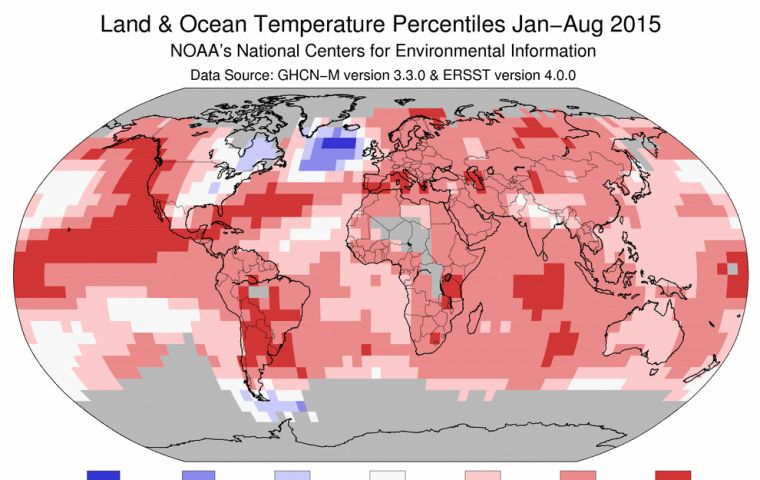MercoPress. South Atlantic News Agency
Cold 'blob' in part of North Atlantic Ocean puzzles scientists
 Located close to Greenland, the Atlantic “blob” started appearing on maps and data software across the world a couple of years ago.
Located close to Greenland, the Atlantic “blob” started appearing on maps and data software across the world a couple of years ago. Over the past few months, scientists have been trying to explain an area of very cold temperatures in a part of the North Atlantic Ocean. In fact, when the rest of the world was recording above average highs in temperature, making the year the hottest to-date, this part of the Atlantic was cold. The area is being called the Atlantic “blob.”
Located close to Greenland, the Atlantic “blob” started appearing on maps and data software across the world a couple of years ago.
What makes it strange is that while this area is cold, it is a complete contrast to the warm temperatures over the Pacific. This warming has been attributed to El Niño, a natural process where warm water sloshes over the Central Pacific and extends to South America, but scientists are still not sure about what is causing the Atlantic “blob”.
According to a study by Michael Mann of Penn State and Stefan Rahmstorf of the Potsdam Institute for Climate Impact Research, the creation of this cold zone in an otherwise hot year is an indication that AMOC, Atlantic Meridional Overturning Circulation Program, is slowing down.
“The fact that a record-hot planet Earth coincides with a record-cold northern Atlantic is quite stunning,” said Rahmstorf, according to Weather.com.
The AMOC is the Atlantic ocean's so-called “meridional overturning circulation” and is driven by differences in ocean temperature and salinity in the North Atlantic, explain Mann and Rahmstorf, according to The Washington Post.
While scientists are still working on it, what this means in simple terms is that the circulation of water in the oceans might be slowing down. This will impact levels of ocean water and marine life.
“This circulation pattern is tied to the productivity of the North Atlantic, one of the most productive regions from a fisheries standpoint. So if the AOMOC were literally to shut down, you could see sharp decreases in marine productivity in this region,” Mann said, according to The Washington Post.




Top Comments
Disclaimer & comment rules-

-

-

Read all commentsI notice that this cold spot is directly off the West coast of Scotland !!
Oct 02nd, 2015 - 09:23 am 0It's an English plot to freeze us into submission. We demand that VAT be set at zero rate for electricity, gas and oil used for heating.
One good point is that it is good for fish stocks as they prefer cold water and it may also stop the downturn in our seabird populations.
I'd say the salinity of the water should be measured.
Oct 02nd, 2015 - 10:08 am 0I'll wager its fresh. I think that's the result of the ice cap melting starting to manifest itself.
Another Ice Age is starting. The northern hemisphere need a lot of energy to survive the next 100,000 years. The problem will be the food that I think that you will have no money to pay for it.
Oct 02nd, 2015 - 11:17 am 0Commenting for this story is now closed.
If you have a Facebook account, become a fan and comment on our Facebook Page!